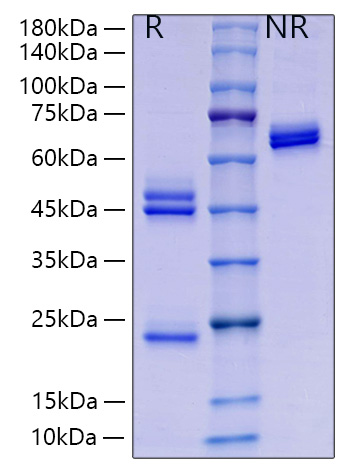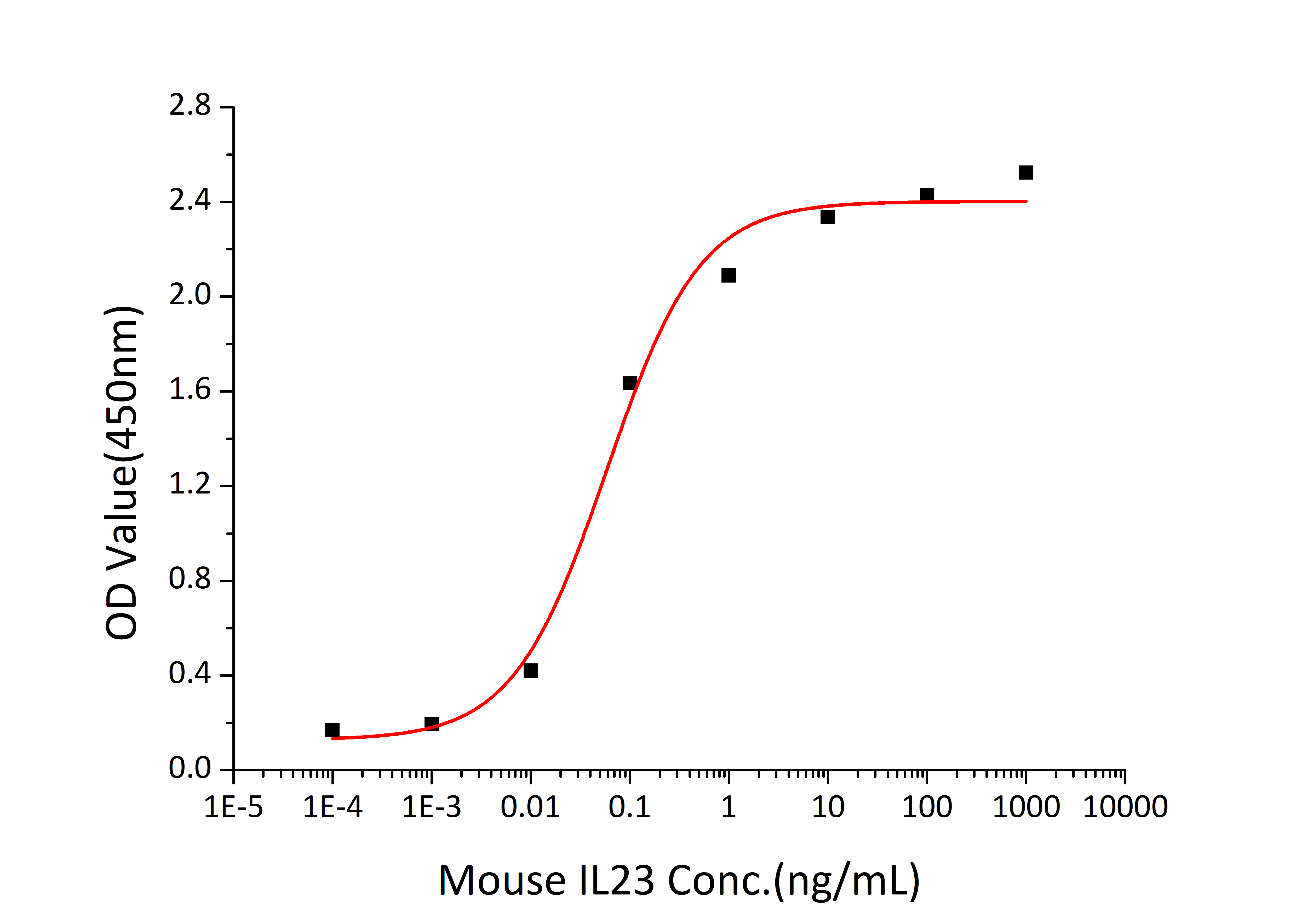Description
Recombinant Mouse IL-23/IL-12B&IL-23A Protein
The Recombinant Mouse IL-23/IL-12B&IL-23A Protein is a high-quality recombinant protein designed for murine biological research applications. This protein serves as an essential reagent in mouse model studies, comparative immunology research, and preclinical therapeutic evaluations, enabling scientists to investigate IL-23/IL-12B&IL-23A biology and its relevance to human disease mechanisms through translational research approaches.
This product (SKU: RPCB1900) is produced using HEK293 cells and features a N-His(IL-23a)&No tag(IL-12b) tag for convenient detection and purification. The protein exhibits a calculated molecular weight of 19.73 kDa(IL-23A) , 35.79 kDa(IL-12B) with an observed molecular weight of 20-25 kDa(IL-23A) , 45-50 kDa(IL-12B) under denaturing conditions, achieving ≥ 90% as determined by SDS-PAGE.. Functional bioactivity has been validated through rigorous quality control assays, confirming its suitability for demanding research applications.
Key Features
| High Purity by Affinity Chromatography | |
| Mammalian & Bacterial Expression Systems | |
| High lot-to-lot consistency via strict QC |
| Product Name: | Recombinant Mouse IL-23/IL-12B&IL-23A Protein |
| SKU: | RPCB1900 |
| Size: | 10 μg , 20 μg , 50 μg |
| Reactivity: | Mouse |
| Synonyms: | p40, Il-12b, Il12p40, Il-12p40, IL12B, p19, IL-23, il23A |
| Tag: | N-His(IL-23a)&No tag(IL-12b) |
| Expression Host: | HEK293 cells |
| Calculated MW: | 19.73 kDa(IL-23A) , 35.79 kDa(IL-12B) |
| Observed MW: | 20-25 kDa(IL-23A) , 45-50 kDa(IL-12B) |
| Gene ID: | 83430 |
| Protein Description: | High quality, high purity and low endotoxin recombinant Recombinant Mouse IL-23/IL-12B&IL-23A Protein (RPCB1900), tested reactivity in HEK293 cells and has been validated in SDS-PAGE.100% guaranteed. |
| Endotoxin: | < 0.1 EU/μg of the protein by LAL method. |
| Purity: | ≥ 90% as determined by SDS-PAGE. |
| Formulation: | Lyophilized from a 0.22 μm filtered solution of PBS, pH 7.4. |
| Bio-Activity: | Measured by its ability to induce IL-17 secretion by mouse splenocytes. The ED 50 for this effect is 29.1-116.4 pg/mL, corresponding to a specific activity of 8.59×10 6 ~3.44×10 7 units/mg. |
| Reconstitution: | Centrifuge the vial before opening. Reconstitute to a concentration of 0.1-0.5 mg/mL in sterile distilled water. Avoid vortex or vigorously pipetting the protein. For long term storage, it is recommended to add a carrier protein or stablizer (e.g. 0.1% BSA, 5% HSA, 10% FBS or 5% Trehalose), and aliquot the reconstituted protein solution to minimize free-thaw cycles. |
| Storage: | Store at -20℃.Store the lyophilized protein at -20℃ to -80 ℃ up to 1 year from the date of receipt. After reconstitution, the protein solution is stable at -20℃ for 3 months, at 2-8℃ for up to 1 week. |
Interleukin 23 (IL-23) is a heterodimeric cytokine composed of two disulfide-linked subunits, a p19 subunit that is unique to IL-23, and a p40 subunit that is shared with IL-12 (1-5). The p19 subunit has homology to the p35 subunit of IL-12, as well as to other single chain cytokines such as IL-6 and IL-11. The p40 subunit is homologous to the extracellular domains of the hematopoietic cytokine receptors. Mouse p19 cDNA encodes a 196 amino acid residue (aa) precursor protein with a putative 19 aa signal peptide and 177 aa mature protein. Human and mouse p19 share 70% aa sequence identity. Although p19 is expressed by activated macrophages, dendritic cells, T?cells, and endothelial cells, only activated macrophages and dendritic cells express p40 concurrently to produce IL-23. The functional IL-23 receptor complex consists of two receptor subunits, the IL-12 receptor beta 1 subunit (IL-12 R beta 1) and the IL-23-specific receptor subunit (IL-23 R). IL-23 has biological activities that are similar to, but distinct from IL-12. Both IL-12 and IL-23 induce proliferation and IFN-gamma production by human T?cells. While IL-12 acts on both na?ve and memory human Tnbsp;cells, the effects of IL-23 is restricted to memory Tcells. In mouse, IL-23 but not IL-12, has also been shown to induce memory T cells to secret IL-17, a potent proinflammatory cytokine. IL-12 and IL-23 can induce IL-12 production from mouse splenic DC of both the CD8- and CD8+ subtypes, however only IL-23 can act directly on CD8+ DC to mediate immunogenic presentation of poorly immunogenic tumor/self peptide.








